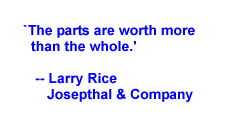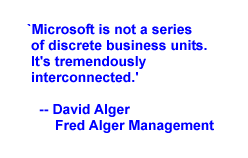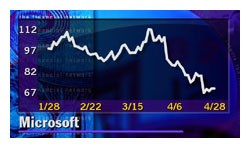|
Wall Street weighs a split
|
 |
April 29, 2000: 8:29 a.m. ET
Gates calls breakup harmful to investors; analysts see potential value
|
NEW YORK (CNNfn) - The government's proposal to split Microsoft into two companies as a remedy for its monopolistic practices sets the stage for further courtroom debates as the software giant appeals the case.
At the center of another debate is whether such a split would be a boon or a bust for Microsoft (MSFT: Research, Estimates) shareholders.
The Justice Department and a group of state attorneys general asked a federal court Friday to split Microsoft into two separate companies - one containing its Windows operating systems, the other containing the rest of its business lines - to stem its anti-competitive behavior.
Microsoft co-founder and chairman Bill Gates blasted the idea, saying that such a split would hurt shareholders.
"No one should think that shareholder value would be preserved" after a breakup, Gates told reporters in a teleconference shortly after the government submitted its proposal. "Microsoft would be greatly damaged by this kind of split."
And it is by no means certain such a division will occur. Microsoft has vowed to appeal the case, a process some observers expect to drag on for years.
Even so, Wall Street is trying to sort out how a "Baby Bill" scenario would affect the company's current $363 billion market value.
Some Microsoft boosters say that even if the company is forced to split, the resulting entities would remain a formidable force in the software industry.
 The Redmond, Wash.-based company divides its business into three major segments: Windows Platforms, which includes its Windows 98, Windows 2000, and Windows NT operating systems; Productivity Applications, which includes its Office software as well as enterprise software; and Consumer, Commerce and Other, which includes consumer software products as well as consulting, training, and Internet access. The Redmond, Wash.-based company divides its business into three major segments: Windows Platforms, which includes its Windows 98, Windows 2000, and Windows NT operating systems; Productivity Applications, which includes its Office software as well as enterprise software; and Consumer, Commerce and Other, which includes consumer software products as well as consulting, training, and Internet access.
When the company reported its fiscal third-quarter results earlier this month, Microsoft reported revenue of more than $5.6 billion, with operating systems sales representing roughly 41 percent and applications roughly 46 percent.
"The parts are worth more than the whole," Larry Rice, chief investment strategist at Josepthal & Company, told CNNfn Friday.
"That theory seems to have worked nicely in the past with a lot of different companies in different industries," Rice added. "The stock's down, what, 40 .. 45 points? I'd rather venture into that at this point and take my risk with the Justice Department than some of the other stocks in Nasdaq."
Do Standard Oil, AT&T compare?
By spinning off the software and other segments of its business, Microsoft shareholders would hold positions in two strong software companies instead of one, a scenario that yielded substantial windfall gains for AT&T (T: Research, Estimates) when the government sliced the telecommunications giant up in 1984, Rice said.
Standard Oil shareholders also benefited when the government split it company up in 1911.
In Microsoft's case, however, the scenario would be much different, noted David Alger, a fund manager at Fred Alger Management.
Alger, who said he expects Microsoft ultimately will prevail in the courts and remain intact, pointed out that there were vast differences in the way AT&T and Standard Oil's companies were structured.
"Standard Oil was assembled by Rockefeller going out saying, 'Let us buy you, or we'll put you out of business,' but those were discrete business units," Alger said. "With AT&T, once again, they had fairly discrete geographical business units.
 "You can't compare Microsoft in any way to either of those two companies," Alger added. "Microsoft is not a series of discrete business units. It's tremendously interconnected." "You can't compare Microsoft in any way to either of those two companies," Alger added. "Microsoft is not a series of discrete business units. It's tremendously interconnected."
Even if the government did prevail, though, and Microsoft is split into two, Alger said he would not expect any negative impact on its stock in the long run.
"You'd really have to see where the fault lines were between the two entities, who the management was and what each entity's financial capabilities were," he said. "But in time, it would probably be moot. I don't think that it would make any difference. The result would be two very big, very powerful companies."
The company's stock was fairly stable in Friday's session, finishing down a fraction at 69-3/4. But Microsoft shares have been battered in recent weeks, driven in part by the developments in the antitrust case, but perhaps more so by a downbeat revenue forecast executives gave when they reported the company's most recent corporate earnings.
 That prompted some bearish comments from several key analysts, including Goldman Sachs' Rick Sherlund, who removed Microsoft from his firms "recommended" list, saying the increased competition Microsoft is facing as the computing model shifts from being PC-centered to network-centered could cause the company to "atrophy." That prompted some bearish comments from several key analysts, including Goldman Sachs' Rick Sherlund, who removed Microsoft from his firms "recommended" list, saying the increased competition Microsoft is facing as the computing model shifts from being PC-centered to network-centered could cause the company to "atrophy."
A shifting strategy
Though there is some debate as to whether the "PC era" is ending and making way for a network-based computing environment where applications and data can be accessed using a range of "information appliance" type devices, most observers agree that the PC, and by extension, the operating system, is becoming far less important.
"This business is atrophying," Joseph Farley, software analyst with Donaldson, Lufkin & Jenrette, told CNNfn Friday. "When you look at Microsoft's dominance in the software industry, it's the dominance of the desktop world. And that is not the future; it's very much the past."
But Farley, who maintains a "buy" rating on Microsoft, said the company is moving in lockstep with the broader computing industry and will be a strong competitor, but not likely a leviathan.
"It's going to be a very strong business for them going forward, but it's not a jumping off point into new dominance," he said. "It's not a jumping off point into the Internet. And it's not any platform that I can see them having any way to extend their supposed monopoly."
Farley said he based his "buy" recommendation largely on confidence in Microsoft's Windows 2000 operating system, which was launched in mid-February.
Windows 2000, designed to replace its Windows NT platform currently used widely in corporate computer networks, and offers extended features including advanced electronic commerce tools and improved ways to connect Windows 2000 servers to older computer systems.
"This is an industry event, and Microsoft is not going to own it," Farley said. "But I think they're going to change the economics. Free of the government's pressure ... Microsoft's efforts would usher in an era of creativity, entrepreneurialism and activity in the server marketplace that we have never seen before, very much like we saw in the PC era when it was first booming; when it was first mushrooming and blossoming in the 1980s and early 1990s."
Microsoft executives also have unveiled plans to assemble an Internet-based platform of "Next Generation Windows Services," designed to be usable by a range of devices, not necessarily a Windows-based PC.
Expect a bumpy ride
Whatever role Microsoft ends up playing in the industry in the long run, some company watchers said investors should expect to see continued volatility in the stock as the antitrust case wends its way through the legal system.
CIBC World Markets analyst Melissa Eisenstat, who earlier this month downgraded Microsoft to "hold" from "buy," citing the antitrust suit's potential to negatively impact the company's operating model, stood by that theory Friday.
"Regardless of the remedy proposal, our investment thesis remains intact," she said in a research note to clients. "We downgraded the stock in early April based on our belief that the litigation process rendered our earnings model suspect. Remedies less draconian than a breakup of the company could result in pricing and bundling changes, Such measures could very well change the growth prospects for the company down the road."
Eisenstat, who pointed out that if the judge agrees to the government's request to break up Microsoft, the company's "could take years," also has said she expects a lackluster fourth quarter for Microsoft due to slow sales of Windows 2000 and weaker PC sales.
"We believe ongoing trading volatility will continue to be a factor investors will have to contend with," she said.
Advisers to the Justice Department said in documents filed Friday that the effect of a breakup of the Microsoft could be positive for shareholders over the medium to long term.
"Depending on management's execution of the separation, the performance of the two independent companies, market conditions and a number of other factors, the impact of the proposed separation of the market value of the current Microsoft share owners' holdings could be positive," Robert Greenhill and Jeffrey Williams said in a deposition.
The Justice Department retained their firm, Greenhill & Co. LLC, a Wall Street financial company specializing in mergers and acquisitions, to help prepare its proposed remedies in the case.
Greenhill and Williams also concluded that in the intermediate to long term "there will not be a material decrease in the value of the current Microsoft shareowners' holdings" because of a breakup, although they did not comment on the effect of general market or other unrelated conditions. 
-- Reuters contributed to this report
|
|
|
|
|
 |

|

